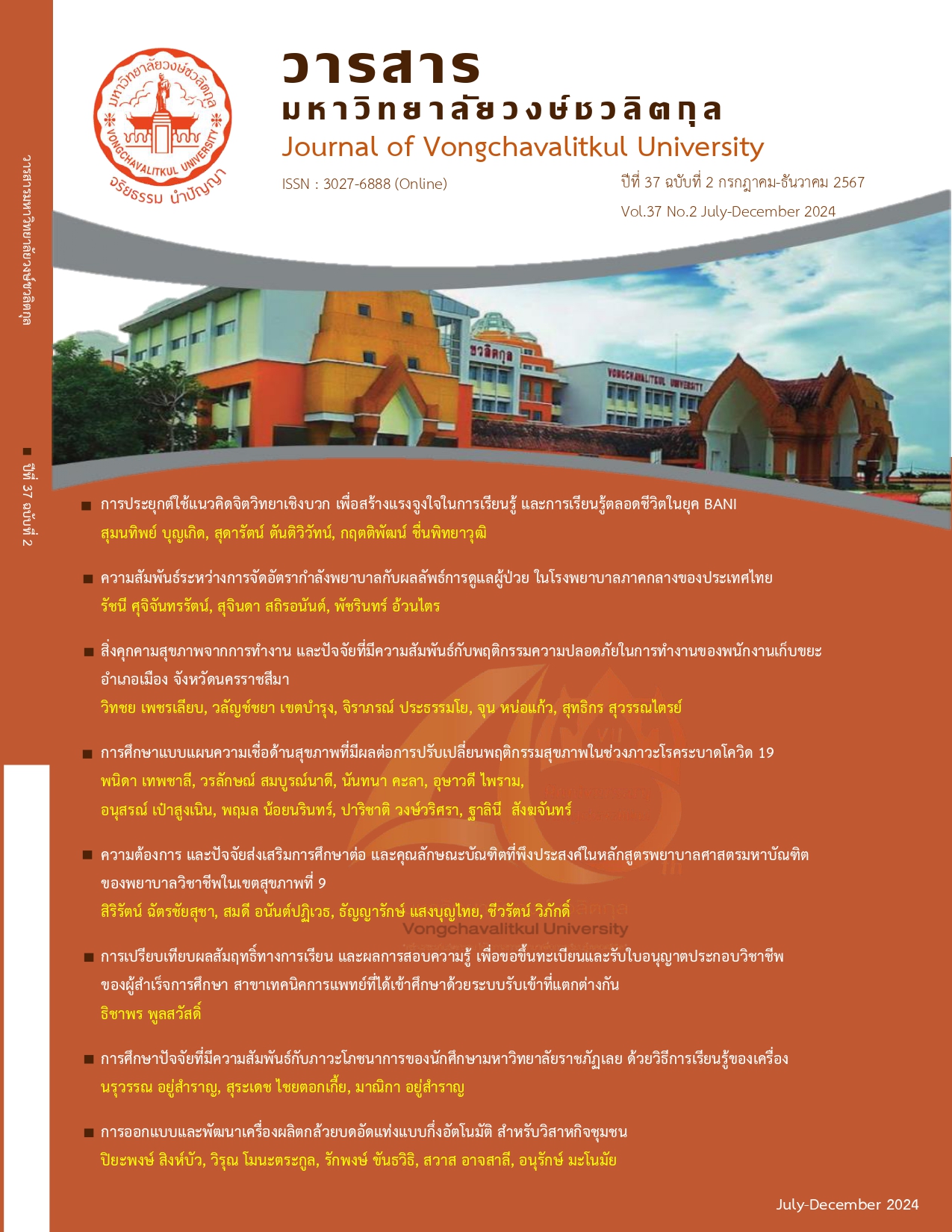A Study of Factors Associated with Nutritional Status of Loei Rajabhat University Students by Machine Learning
Main Article Content
Abstract
Objective: This study aimed to identify factors associated with the nutritional status of students at Rajabhat Loei University and compare the effectiveness of machine learning algorithms in predicting nutritional status.
Methods: This cross-sectional analytical study involved a sample of 1,020 participants categorized into three nutritional status groups using Body Mass Index (BMI) criteria: undernutrition, normal nutrition, and overnutrition/obesity. Ordinal logistic regression was used to analyze the relationships between independent variables and nutritional status. The prediction of nutritional status using machine learning was conducted using three datasets: training, validation, and testing sets. The algorithms evaluated included Support Vector Machine (SVM), Naïve Bayes (NB), Decision Tree (DT), Random Forest (RF), CART, C5.0, Gradient Boosting Machine (GBM), Logistic Regression (LR), and k-nearest neighbors (KNN).
Results: The research findings revealed that 13.53% of participants had undernutrition, 60.78% had normal nutrition, and 25.69% had overnutrition or obesity. Factors significantly associated with nutritional status included gender, year of study, perception of weight change, nutritional knowledge, and self-management of nutrition. The effectiveness of nutritional status prediction using machine learning showed that the C5.0 algorithm had the highest efficiency, with a correct prediction of 60.78 percent (S.D.=0.00). However, when considering the efficiency of classification by group using the confusion matrix, the C5.0 algorithm fails to classify the sample class 1 and 3. Therefore, the efficiency of the Logistic Regression algorithm was considered, which had the second highest efficiency, with a correct prediction of 59.51 percent (S.D.=3.03), slightly different from the C5.0. It had the highest efficiency in classifying the groups with the reliability, recall, and counterbalance of 0.31, 0.33 and 0.27 respectively. Therefore, in this research, the Logistic Regression algorithm was considered the most appropriate machine learning method for further development. This study lead to a more effective classification of nutritional status and prevention and correction of nutritional problems.
Article Details

This work is licensed under a Creative Commons Attribution-NonCommercial-NoDerivatives 4.0 International License.
References
จารุวรรณ มิเถาวัลย์, ศศิธร จันดา, วีระพงษ์ เสียมภูเขียว, ศรัญญ่า เวชกิจ, อัญชลี จันทร์ดี, อาริชัย พันธุ์กาฬสินธุ์ และสุพรรณี พฤกษา. (2561). พฤติกรรมการบริโภคอาหารของนักศึกษามหาวิทยาลัยราชภัฏเลย. ในการประชุมวิชาการระดับชาติ ราชภัฏเลยวิชาการ ประจำปี 2561 เรื่องการบูรณาการภูมิปัญญาสู่นวัตกรรมและการพัฒนาอย่างยั่งยืน, มหาวิทยาลัยราชภัฏเลย. 2123-2130.
ณัฐธยาน์ ชาบัวคำ. (2562). ความรู้ทางโภชนาการ ทัศนคติต่ออาหาร พฤติกรรมการบริโภคอาหาร และภาวะโภชนาการของนักศึกษาพยาบาลศาสตรบัณฑิต วิทยาลัยพยาบาลบรมราชชนนี สรรพสิทธิประสงค์. ราชาวดีสาร วิทยาลัยพยาบาลบรมราชชนนี สุรินทร์, 9(1), 18-29.
ภัททิรา ก้านทอง, ชัยณรงค์ เลขราบ, ฐิมาพร วงศ์ศิริ และทิพวารินทร์ พิมล. (2562). รูปแบบพฤติกรรมการบริโภคอาหารและภาวะโภชนาการของนักศึกษาและบุคลากรมหาวิทยาลัยราชภัฏชัยภูมิ. วารสารการพยาบาลและการดูแลสุขภาพ, 37(1),
-127.
สุระเดช ไชยตอกเกี้ย, สุพรรณี พฤกษา และจิตติมา พีรกมล. (2565). ความรอบรู้ด้านโภชนาการและผลลัพธ์ทางสุขภาพของนักศึกษามหาวิทยาลัยราชภัฏเลย. รายงานวิจัย คณะวิทยาศาสตร์และเทคโนโลยี มหาวิทยาลัยราชภัฏเลย. เลย: มหาวิทยาลัยราชภัฏเลย.
Almoraie, N. M., Alothmani, N. M., Alomari, W. D., & Al-Amoudi, A. H. (2024). Addressing nutritional issues and eating behaviours among university students: a narrative review. Nutrition Research Reviews, 2024 Feb 15, 1-16. doi: 10.1017/S0954422424000088
Bahramfard, T., Omid Salehi, S., Akbartabar Toori, M., Pourmahmoudi, A., Jowshan, M., Parvin, S., & Malekzadeh, J. (2020). Nutritional literacy status and its related factors in students of Yasuj University of Medical Sciences. Nutrición Clínica Y Dietética Hospitalaria, 40(4), 55-62. https://doi.org/10.12873/404malekzadeh
Hussein, K., Mekonnen, T. C., Hussien, F. M., Alene, T. D., & Abebe, M. S. (2023). School feeding and nutritional status of students in Dubti district, Afar, Northeast Ethiopia: Comparative cross-sectional study. Pediatric Health, Medicine and Therapeutics, 14, 217-230. https://doi.org/10.2147/ PHMT.S412740
Islam, M. M., Rahman, M. J., Roy, D. C., Ahmed, N. F., Hussain, S., & Maniruzzaman, M. (2022). Application of machine learning based algorithm for prediction of malnutrition among women in Bangladesh. International Journal of Cognitive Computing in Engineering, 3, 46-57. https://doi.org/10.1016/j.ijcce.2022. 02.002
Kesari, A., & Noel, J. Y. (2024). Nutritional Assessment. Treasure Island (FL): StatPearls Publishing. PMID: 35593821
Kishore, K. K., Suman, J. V., Mnikyamba, I. L., Polamuri, S. R., & Venkatesh, B. (2023). Prediction of malnutrition in newborn Infants using machine learning techniques. Research Square. doi: 10.21203/rs.3.rs-2958834/v1
Ntentie, F. R., Angie Mbong, M. A., Tonou Tchuente, B. R., Biyegue Nyangono, C. F., Wandji Nguedjo, M., Bissal, C., … Oben, J. E. (2022). Malnutrition, eating habits, food consumption, and risk factors of malnutrition among students at the university of Maroua, Cameroon. Journal of Nutrition and Metabolism, 1431743. doi: 10.1155/2022/1431743.
Sagala A. B. M., Rekawati, E., & Nursasi, A. (2024). The effect of nutritional management in the nutritional status of patients with Pulmonary Tuberculosis: A systematic review literature. Indonesian Journal of Global Health Research, 6(3), 1161-1172. https://doi.org/10.37287/ijghr.v6i3.3085
Sandri, E., Pardo, J., Cantín Larumbe, E., Cerdá Olmedo, G., & Falcó, A. (2024). Analysis of the influence of educational level on the nutritional status and lifestyle habits of the young Spanish population. Front Public Health, 12, 1341420. doi: 10.3389/fpubh.2024. 1341420
Turjo, E. A., & Rahman, M. H. (2024). Assessing risk factors for malnutrition among women in Bangladesh and forecasting malnutrition using machine learning approaches. BMC Nutrition, 10, 22. https://doi.org/10.1186/s40795-023-00808-8
Ul Haq, I., Mariyam, Z., Li, M., Huang, X., Jiang, P., Zeb, F., … Zhou, M. (2018). A comparative study of nutritional status, Knowledge Attitude and Practices (KAP) and dietary intake between international and Chinese students in Nanjing, China. International Journal of Environmental Research and Public Health, 15(9), 1910. doi: 10.3390/ ijerph15091910
World Health Organization: WHO. (2024). Malnutrition. Online, Retrieved on 12 August 2024 from https://www.who. int/news-room/fact-sheets/detail/ malnutrition
WHO, Regional Office for the Western Pacific: WPRO, International Association for the Study of Obesity: IASO, International Obesity Task Force: IOTF. (2000). The Asia-Pacific Perspective: Redefining obesity and its treatment. Sydney: Health Communications Australia Pty Ltd.


